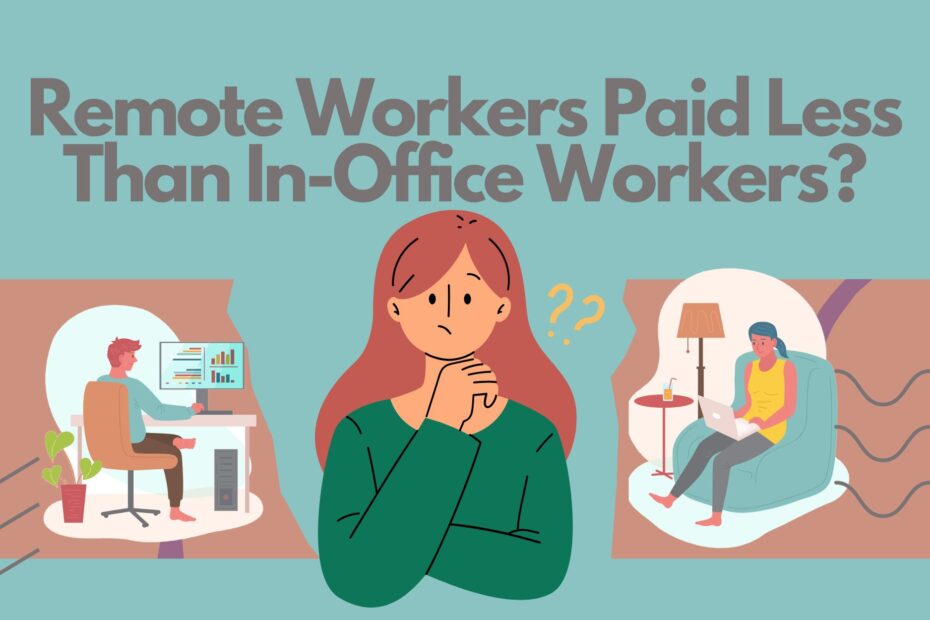The sudden surge in remote work has become a hallmark of the 21st century workplace, with employers seizing the opportunity to capitalize on the freedom of employees to work from the beach or dungeon or even from their own homes. Despite bright promises of “flexibility” and “location independence,” many whisper privately that remote workers are being paid less. But is this just an unfounded rumor, or is there some truth to it? In this exciting read, we delve into the data to find out whether remote workers really do make a living from ramen noodles, and unravel the mysterious factors shaping their financial fortunes.
The Traditional Office Pay Structure
So, let’s talk about the classic “traditional office compensation structure,” which is as pleasing to the eye as a well-oiled machine. Imagine that your salary is like a ball chain, tied to your desk, and only increases when you are lucky enough to jump through the corporate hoop. If you’re in the right place at the right time, you might be paid like a king. But if you’re stuck in a poor economy or where your skills are less demanding, you’re scraping by like a farmer. And, don’t even think about changing roles within the company, your compensation package is more stuck than a fly in a spider’s web.
The Remote Work Pay Structure
Remote work compensation structures are the black sheep of the compensation world, deviating from the norms of traditional office structures. Remote workers are not constrained by geography and proximity to offices, but rewarded for their strength and expertise. In some cases, remote workers may even be paid higher salaries for their unique skills, but in other cases they may be considered second-class citizens whose salaries are lowered as employers perceive remote work to be less demanding. lower.
But let’s not forget that some remote workers have added duties like serving as office janitors, dealing with rowdy family members, and fixing their own equipment. It’s only fair that they go the extra mile to get a hefty sum, right? Oh wait, in some industries, the fact that they work remotely is enough to get them paid less. But hey, at least they don’t have to deal with commuting!
You may also like: Earning Big from Home: The Top Paying Remote Jobs
Comparison of Pay for Remote and In-Office Workers
The age-old question of whether remote workers are paid less than office workers is an unresolved puzzle. On the one hand, it’s like playing rock-paper-scissors, where employers save on office costs, but remote workers have the upper hand because their hours are flexible and uninterrupted. But on the other hand, you can also go the other way and say that remote workers suffer because their bosses don’t have to pay office expenses.
On the one hand, remote workers are freed from the constraints of a brick-and-mortar office, but on the other hand, they miss out on all the perks that come with a corporate office, like free coffee and snacks. Don’t forget the cost of setting up and maintaining a home office.
At the end of the day, it’s a horse race, and the answer to whether remote workers are paid less is “it depends.” But let’s be honest, who really cares about money when you’re working in your pajamas all day?
Note: Some companies may have different compensation structures for remote workers and office workers, while others may have the same compensation structure for both groups. To determine whether remote workers are paid less than office workers, one must look at the specific compensation packages for each type of employee in a particular company or industry.
The Future of Remote Work and Pay
The rise of remote work has taken the modern workplace by storm, and the future is changing every day. Companies may tout the benefits of remote work, but who’s to say whether those purported benefits will translate into remote workers’ cold hard cash?
On the one hand, companies may recognize the cost savings of working remotely and reward remote workers with higher salaries. After all, remote workers can save companies from paying office rent and all the fancy coffee machines. Yet, somehow, they still manage to get the same quality work done as their office colleagues. So companies may want to keep their star remote employees with some sweet compensation.
But on the flip side, remote work could also be a cost-cutting tool for companies. They can take advantage of the lower cost of living in some areas and pay less to remote workers. Why offer competitive pay when they can save some spare change? It was like eating a piece of cake!
So the future of remote work compensation is as hazy as the morning fog. Will remote workers bask in the warm sunshine of fair compensation, or will they be left out? Time will prove everything.
Worth reading: Preparing for the Future of Remote Work: Strategies for Employers
Conclusion
It’s a myth! The idea that remote workers are treated as second-class citizens and paid less is just a myth. The age-old compensation structure of traditional office workers, based on factors like distance from the boss and restaurant seniority, still dominates for field workers. But it’s a different story for remote workers — it all depends on what you bring to the virtual dinner table. Your skills, experience and ability to produce results – these determine your compensation.
So rest assured, remote workers, you’re not always out of pocket. As remote work becomes more common, compensation structures are finally catching up, and employers are starting to judge all workers based on their abilities, not just their location. Honestly, at the end of the day, the most critical aspect for all employees, whether remote or in the office, is to strive for a salary that reflects their value.






